

Literary Terms - Ms. Bigelow @ NHS. The Language of Literary Analysis These are the words and expressions that describe the way readers read and analyze literature.
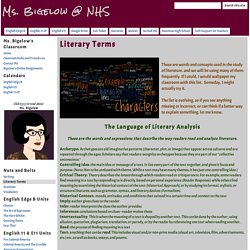
Archetype: Archetypes are old imaginative patterns (character, plot, or image) that appear across cultures and are repeated through the ages. Scholars say that readers recognize archetypes because they are part of our "collective unconscious. " Controlling Idea: the main idea or message of a text. It ties every part of the text together, and gives it focus and purpose. Critical Theory: Theory describes the lenses through which readers read or critique texts.
Historical Context: moods, attitudes, and conditions that existed in a certain time and connect to the text Imply: author gives clues to the reader Infer: reader interprets the clues the author provides. Used Books in Class. Jabellpepper world - Home. Coursesite for Craig White, Literature & Humanities, UHCL. Humanities Basic Texts Webpage (materials for instructors and students of HUMN 3031, 3033, & 3035) Literature Program Webpage 2007 Sigma Tau Delta White family updates (21 Sept. 2008; Oct. 4, 2006; 25 Nov., 20 & 5 Oct., 28 Sept. 2005; May 2011) White Bookblog: "Pilgrims & Sequels" poetry analysis: pre-AP/AP English vertical team, North Shore Senior High Friday, 28 October 2011 Introduction to Satire Writing about Fiction: pre-AP/AP Galena Park ISD Writing about Literature: pre-AP/Ap Galena Park ISD 9 Nov. 2013 Liberal Arts Careers Page.
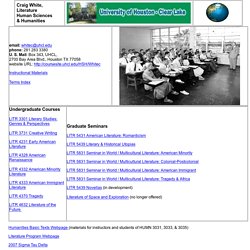
ENG 1001: Evaluation Criteria for Essays. IVCC's online Style Book presents the Grading Criteria for Writing Assignments.
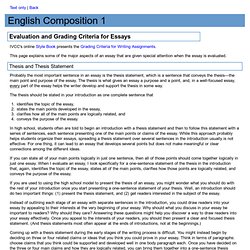
This page explains some of the major aspects of an essay that are given special attention when the essay is evaluated. Thesis and Thesis Statement Probably the most important sentence in an essay is the thesis statement, which is a sentence that conveys the thesis—the main point and purpose of the essay. Surprise Endings: Social Science and Literature. Course Description “Surprise Endings” is a for-credit Duke University course with a public component.
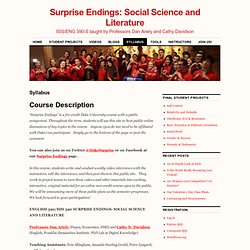
Throughout the term, students will use this site to host public online discussions of key topics in the course. Anyone (you do not need to be affiliated with Duke) can participate. Simply go to the bottom of the page or post the comment. You can also join us on Twitter @DukeSurprise or on Facebook at our Surprise Endings page.
First Year Comp. Inquiry Project. English Composition 1: Home Page. Monday, Wednesday, Friday: 9:00-9:50 am | Room B-213 | Syllabus | Blackboard Monday, Wednesday, Friday: 10:00-10:50 am | Room E-214 | Syllabus | Blackboard Monday, Wednesday, Friday: 1:00-1:50 pm | Room E-214 | Syllabus | Blackboard Word Facts.
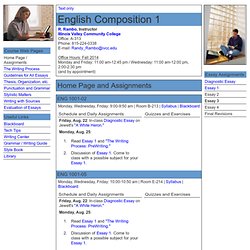
Ms Austin's English - Home. The Posthuman. Final Project: The goal of your final project is to investigate one of the important subjects of this course.
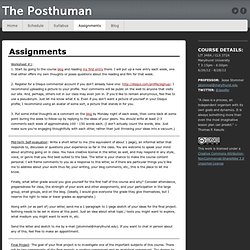
There will be two components of the final project: a creative component and an analytical component. The degree to which these two elements overlap is up to you. Quixotic Pedagogue. MsEffie's LifeSavers for Teachers. LANGUAGE ARTS - The Learning Network Blog. As we do after Memorial Day each year, this week we are looking back and collecting the year’s teaching materials for each subject area, so teachers can find them all in one place.
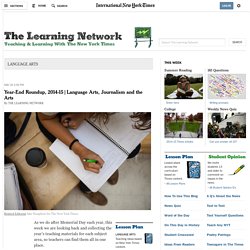
On Wednesday, we posted a list of all of our social studies, history, geography and civics ideas. Below, all our E.L.A. and arts-related posts. On Friday, you’ll find our science, health, math and technology collection. Finally, on June 11 we’ll publish a list of all of the Student Opinion questions we have asked this year. And if you’d like to go further, here are five more years’ worth of lesson plan collections for English language arts, from 2010, 2011, 2012, 2013 and 2014. To find all our roundup posts in every subject area and going back to 2010, click here.
Happy summer, and if we’re missing topics, skills, authors or ideas you wish we’d covered, please tell us below. Read more… "A Room Without Books is Like a Body Without a Soul" – Cicero. Eco-friendly English Teacher. 30th December 2013 Post Six Quibbles with Desolation of Smaug, One to Rule Them All The Hobbit is supposed to be a story about a reluctant, ordinary Joe who grows into a hero, but Peter Jackson makes a small but significant tweak that strikes at the progressive teaching strategies that the original novel gets right.
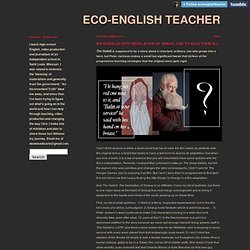
I don’t think anyone is either a book purist that has to have the film match up perfectly with the original text or a tyrant that seeks to have a text burnt to dust by its adaptation; but when you love a book, it is a law of science that you will indomitably have some quibble with the film’s interpretation. Grade Nine Curriculum Guide - Curriculum. Portland Public Schools recognizes the diversity and worth of all individuals and groups and their roles in society.
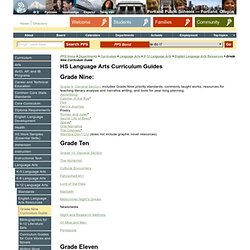
Teach them English. The Literate Learner - InterActive Six Trait Writing Process. Six Traits Writing is a systematic approach for looking at writing one part at a time.
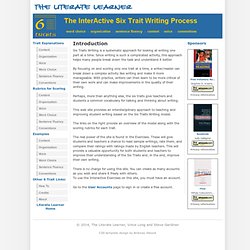
Since writing is such a complicated activity, this approach helps many people break down the task and understand it better. By focusing on and scoring only one trait at a time, a writer/reader can break down a complex activity like writing and make it more manageable. With practice, writers can then learn to be more critical of their own work and can make improvements in the quality of their writing. Perhaps, more than anything else, the six traits give teachers and students a common vocabulary for talking and thinking about writing. This web site provides an interdisciplinary approach to teaching and improving student writing based on the Six Traits Writing model. The links on the right provide an overview of the model along with the scoring rubrics for each trait.